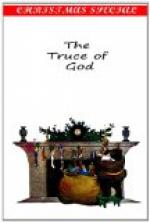While they bore the body to the royal pavilion, the pursuit was continued with terrible effect. The Saxons remembered the losses they had suffered five years before—the Suabians saw their desolated homes and their expiring duke. The small remnant of Henry’s army that escaped the relentless sword and the equally fatal depths of the Elster, were only reserved for a fate still more dreadful. After wandering about, a prey to want and misery, they were now butchered by the peasantry of Saxony and Thuringia, who, armed with hatchets and scythes, flew to avenge upon the relic the wrongs they had suffered from the whole army. Many of the fugitives plunged into the forests, preferring the slow tooth of famine to the swifter stroke of steel. Others, concealing themselves until the first gust of passion was over, besought the mercy of the peasantry, who, at last moved with compassion or glutted with slaughter, received them as fellow-beings, healed their wounds, and sent them to their homes. Henry of Austria, with a suite little proportioned to his rank, fled to Bohemia.
There was none of the exultation of victory in the allied camp that night: each soldier seemed to feel that the conquest had been too dearly won. Rodolph was not only beloved by the Suabians, who from their cradles had experienced his bounty, his virtue, and justice, but he had endeared himself to the Saxons by his affability, his wisdom, and his valor. He had healed their private quarrels and humbled their public enemies; he found them divided and feeble, he left them united and vigorous. They regarded him as the savior of Saxony, and affectionately styled him “Pater patriae.” Nor was the grief of the bishops and priests less ardent and sincere, for they felt that a zealous and dauntless defender of the Church had fallen.
The soldiers, scattered about in groups, slept little, but whispered to each other, and fixed their eyes upon the torches that burned so steadily in the royal pavilion. There was stretched, cold and stiff, the victor of the day, his noble features rigid in death, while his barons knelt weeping around the bier, and the Archbishop of Mayence recited prayers for his soul. The night wore away, and when the morning broke out cheerfully as though no care were in the world, Gilbert de Hers still knelt beside the corpse of the king. No tears were in his eyes then, and the expression of his face varied between deep thought and deep grief. He might have remarked that the scorn had departed from Henry of Stramen’s lip; but he did not. His mind was occupied with other things; and silent and sad, he would not leave his vigil beside the dead.
Early in the morning of the sixteenth, the victorious army, sadder than defeat could ever have made it, entered Merseburg. After the obsequies had been performed with equal solemnity and magnificence, the body of the king was deposited in the choir of the cathedral. A statue of gilt bronze for many a year marked the tomb of Rodolph of Suabia.




